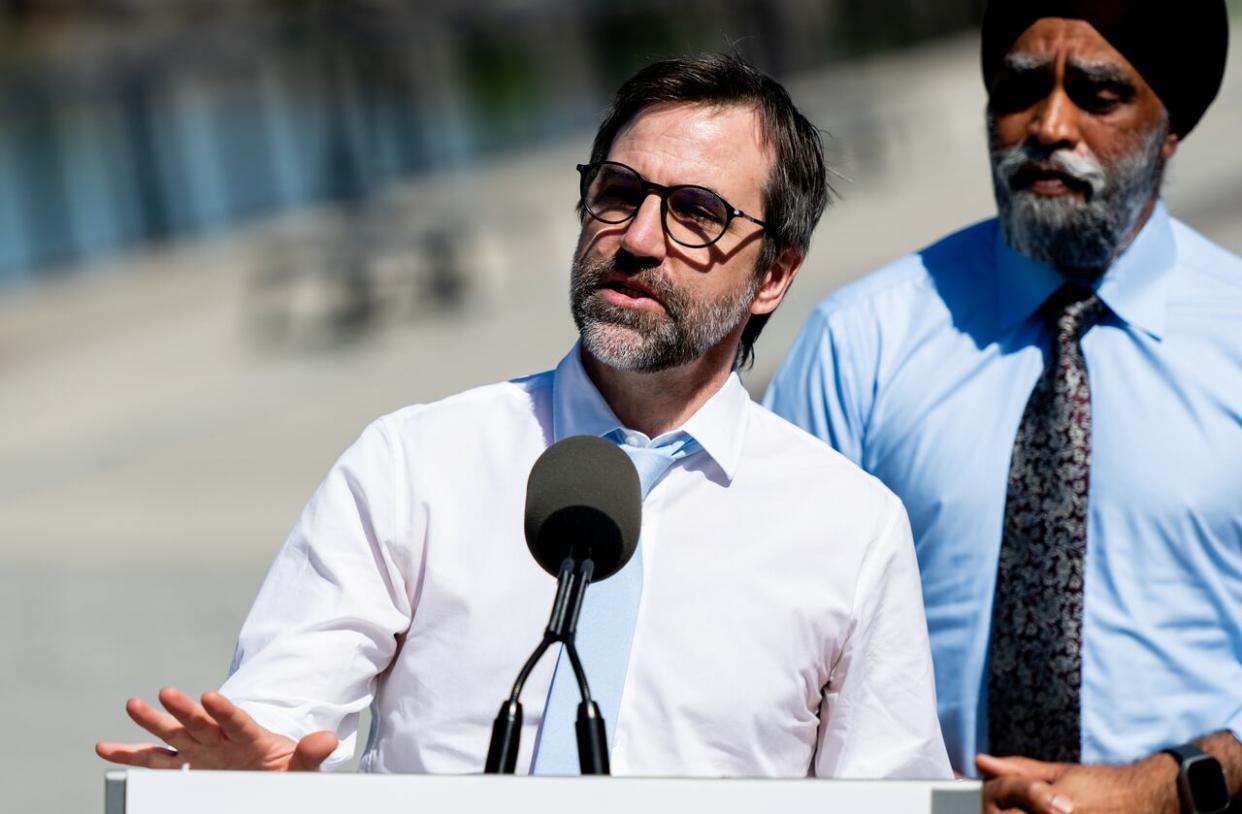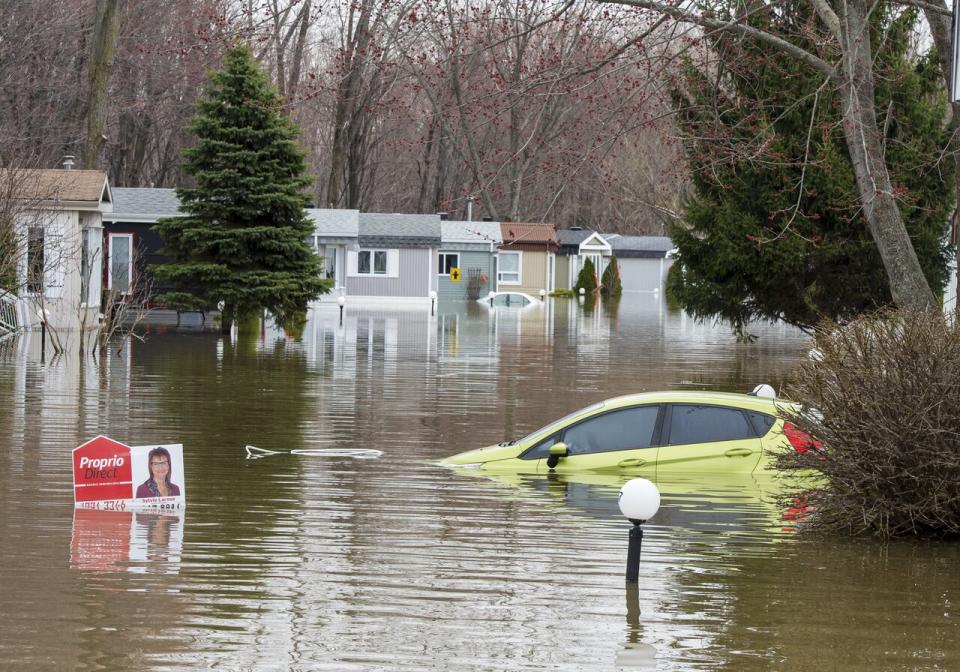$530M fund helps cities adapt to climate change, but Guilbeault suggests more money is needed

Even as he acknowledged it falls short of what local governments are asking for, Environment Minister Steven Guilbeault announced Monday a new federal fund with more than half a billion dollars to help municipalities adapt to climate change.
Guilbeault announced that communities can now apply for their share of $530 million in funding set aside to help their efforts to adapt to a world of higher temperatures and more frequent severe storms — efforts that are likely to continue even if the world's economies significantly cut their carbon emissions.
The minister's office is calling the federal investment "one of the largest ever" in climate adaptation. The money is flowing through the Federation of Canadian Municipalities' (FCM) Green Municipal Fund within the Local Leadership for Climate Adaptation stream.
Guilbeault said he knows the money in the fund — the first such dedicated adaptation fund for municipalities — is well short of the $10 billion over a decade that the FCM requested.
"Half a billion is not $10 billion. But it is not nothing," he said.
"It is a strong commitment on the part of our government to work with our partners in municipalities and the FCM to help our communities be more resilient."
The money can be used by municipalities to develop risk assessments and feasibility studies for proposed projects.
Municipalities can also apply for grants of up to $1 million for shovel-ready projects, such as fire breaks to control wildfires, artificial wetlands to prevent flooding, urban tree planting to help shade community streets, and cooling centres.
By 2031, FCM estimates the fund will have supported more than 1,400 municipal projects.
Tim Tierney, the third vice-president of the FCM and an Ottawa municipal councillor in the city's east end, said the money could be used to bury electrical lines in the nation's capital.
"So we can ensure that power remains on during those storms that we see take out a lot of power lines in our city," he said.
FCM is a national organization that represents more than 2,100 cities and communities in Canada. It conducts policy research and advocates for various positions.
In 2019, FCM and the Insurance Bureau of Canada released an analysis that called for $5.3 billion in annual climate adaptation funding shared between the federal, provincial and municipal governments.

A car sits submerged in floodwater on Wednesday, May 1, 2019 in Ste-Marthe-sur-la-Lac, Que. (Ryan Remiorz/The Canadian Press)
Craig Stewart, vice president of climate change and federal issues at the Insurance Bureau of Canada, said Ottawa and other levels of government need to do more to address Canada's climate adaptation challenges.
"Today's announcement is a good start, but only a fraction of the funding needed," Stewart said. "Funding has been slow to move out the door and is frankly small compared to the need."
Ottawa first announced the $530 million in municipal funding in November 2022, when it finalized its national adaptation strategy. On Monday, it confirmed the program has started accepting applications.
CBC asked Guilbeault why it took almost two years to roll out the program. He said the funding was first "confirmed" in April's budget and his department and FCM have been working on the program details.
Guilbeault's announcement came on the day three B.C. municipalities complained about Ottawa's climate adaptation policy.
The town of Princeton and the cities of Merritt and Abbotsford said in a statement Monday that the federal government has left them "high and dry."
In 2021, the B.C. communities were devastated by an atmospheric river. Recently, Ottawa rejected their Disaster Mitigation and Adaptation Fund applications.
Canadians are already seeing the impacts of climate change in the rising frequency of severe weather events, the disappearance of freshwater resources, more frequent and intense forest fires, shrinking Arctic ice and the acceleration of glacial melting.
In 2023, Canada experienced its hottest summer ever, the largest wildfires in its history, drought in the Prairies and floods in British Columbia and Nova Scotia, according to Environment and Climate Change Canada.
Assessment reports from the Intergovernmental Panel on Climate Change conclude unequivocally that human activities have caused the planet to warm.
Conservative climate adaptation plan?
While announcing the new $530 million adaptation fund, Guilbeault launched a political attack on the Conservatives.
Guilbeault said there is a "sharp contrast" between his Liberal government and the Conservatives on climate adaptation.
"I don't think I have heard the leader of the opposition ever mention the word climate adaptation, climate resilience," Guilbeault said. "He never talks about climate change ... let alone what we need to do."
Guilbeault suggested adaptation is one of the less controversial aspects of the climate file, given that all the provinces and territories have signed on to the federal government's national adaptation strategy.
"That's the contrast between what we are doing and what they have to propose," Guilbeault said.
New Democrats said today's announcement was long overdue.
"The Liberals always talk a big game, then spend years delaying support," said NDP climate critic Laurel Collins.
Collins went on to attack Conservative Leader Pierre Poilievre, who she said leads a party that "can't even agree if climate change is real, let alone helping Canadian cities adapt."
CBC reached out to the Conservatives for comment. The party did not say what its plans are to help Canadians adapt to climate change.
A spokesperson for the Conservatives said the party believes in lowering emissions, but not through a federal carbon tax.
"Instead of spewing fancy words and hot air while making everyone poorer with (Guilbeault's) punishing tax, common sense Conservatives believe the solution is not to raise the cost of energy, but to lower the cost of zero emissions energy and approve green projects," said Sebastian Skamski, director of media relations for the Conservative leader.

 Yahoo News
Yahoo News 
